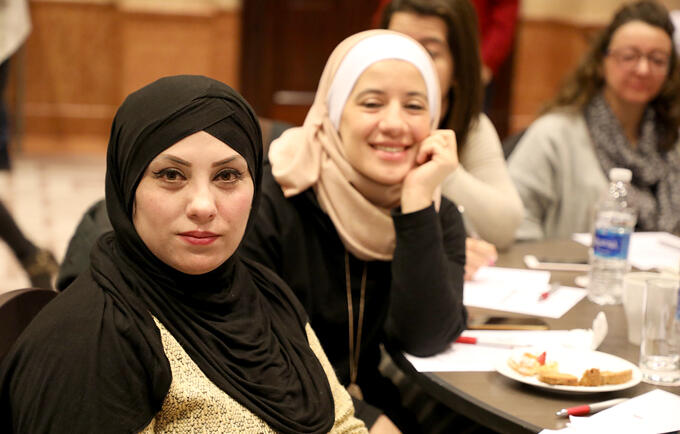This year, COVID-19 has been the biggest challenge to humanitarian operations around the world. The lack of access and restrictions placed by governments around the world has resulted in communities, civil society and local NGOs being the frontline of the response.
Therefore, many inspiring humanitarians fought all these challenges in order to provide virtual support and a safe space for women and girls during lockdown.
One of those inspiring humanitarians is Sheeraz Al-Nsour, a 34 year-old case manager supervisor and psychologist at the Institute for Family Health - one of UNFPA’s implementing partners in Jordan, and a mother of 3 young children who continued providing psychosocial support to survivors of domestic violence during COVID-19 lockdown.
“At first, I thought this situation won’t change anything, and that we will keep providing our services as we did before, but then, day after day, more challenges began to unravel, so we needed to act quickly to respond to these new changes.”
Since Defence Order number 2 imposed lockdown, Sheeraz and other case managers across the country had to change the way they supported survivors of domestic violence and other forms of GBV. In fact, they continued to provide support to survivors through hotlines, providing psychosocial support and information on services available and options depending on their needs and wishes. “It wasn’t easy, especially knowing that survivors are locked in with their perpetrators, which made it even more difficult for them to speak clearly about their situation. In that case, I had to be smart and try to understand her situation and provide her with the support she needs.”
Due to all the challenges, Sheeraz never gave up on the women and girls and remained near all of those who needed her help and support.
“Most of the days I kept working until 11 PM, I remember sometimes while I was having lunch with my family; I would get the phone leaving everything behind me to answer the calls of the women in need. I always woke up early, not only to watch the news and stay up to-date on the situation of COVID-19 and on other NGO’s updates, but also to do my part of household responsibilities, in order to have time for each woman who needed my support.”
Because of the nature of her work, she had to ensure she had space and privacy in the house to provide counseling to the women survivors of domestic violence calling her for help.
Although at times Sheeraz was extremely exhausted, she always received the support from her family. “My husband never stopped supporting me; we share together our household responsibilities, and whenever I got tired he was always there for me. My husband is not the only one who pushes me forward, the gratitude of the women I support motivates me. I remember a survivor once told me “whenever COVID-19 lockdown ends, the first thing I will do is visit your center, not my family because you were the one who stood by my side, and you provided me the care and support I needed”. Words like these keep me strong and encourage me to continue doing what I do best.”


